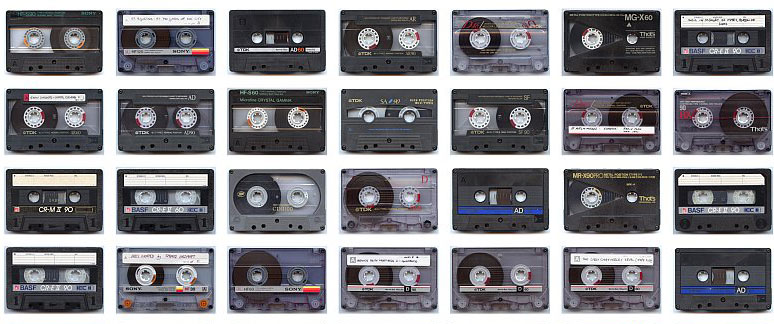

As journalists, we are taught early to “kill your darlings.”
The material may be punchy, savory, heartbreaking, or hilarious, but if it’s not necessary for the story — or if it’s redundant or tangential or in some other way doesn’t fit — don’t use it, and get over it.
David Gerlach wants to help you bring those forgotten interviews out of the shoebox (or the 2007 folder on your hard drive) and onto public radio, podcasts, mobile apps, YouTube, and other platforms. Through his nonprofit DG Multimedia, Inc., the former TV producer founded Blank on Blank, a Brooklyn-based project to resuscitate never-before-heard tape from journalists’ reporting archives.
Journalists submit old tape, and his production team polishes it up. In some cases, they even animate it. Here’s an example of the “lost tape” from Anthony Bozza’s Rolling Stone interview with U2 frontman Bono in October 2001:
If this anecdote sounds familiar, you may have read it in the December 2001 issue of Rolling Stone. But there’s nothing like audio to illustrate how magazines sometimes tweak quotes and altogether change an interviewer’s interjections. (Example: When Bono says his father’s last words were, “Are you all f--king mad?” Rolling Stone prints Bozza as having responded: “That’s amazing. To whom was this addressed?” but listening to the interview, Bozza actually said: “Are you serious? Oh good lord.”)
Other examples of material you’ll find from Blank on Blank: a conversation with Martin Scorsese about the use of soundtracks in his movies; Radiohead’s Thom Yorke on his reputation; Alan Ginsberg’s recording of a hospital visit to actor/director/poet/activist Julian Beck; and puppeteer Caroll Spinney on voicing Big Bird and Oscar the Grouch.
These aren’t just raw tapes: Blank on Blank includes reflections from the interviewers, and context from producers. You’ll hear gravelly phone sound, horns honking, the stuff that so often gets smoothed out in a professional broadcast. (Though it must be noted that purists will cringe at the way Blank on Blank producers sometimes insert their own sounds — clips of records referenced, the growl of a car starting up at the mention of a taxi cab, and so on.)
“The pauses are one of my favorite things,” Gerlach said. “The silence in the interview. That is when you can sense someone’s optimism, someone’s discomfort, someone fumbling for the right words. There’s an intimacy that you get that’s just different. It’s not edited for time. If there’s that choice moment, I want you to hear it. And I want you to hear the police siren in the background, and the papers rustling.”
Gerlach says his years in television left him with a nagging sense of loss over the material that never aired.
“It always amazed me I had this great stuff on tape that I never did anything with and no one ever got to hear it,” he told me. “It just stuck in the back of my head: All this amazing content that was going nowhere, dying on the vine.”
So in December 2010, Gerlach applied for a Knight News Challenge grant. Blank on Blank was just a part-time project back then, but when it became a finalist, he says, “I was like, ‘All right, we’re on to something,’ and that was kind of it.”
Gerlach’s project didn’t end up winning, but he says being in the final 28 was all the inspiration he needed. He began fundraising and incorporated as a nonprofit then early this year quit his TV job to work full-time on Blank on Blank.
“I was at ABC when Steve Jobs died, and everyone was scrambling,” he said. “They wanted something someone had never heard. Everyone was playing the commencement speech, and it was just, ‘This is what we can do.’ Obviously not just when someone passes but journalists all over the country have these amazing sound bites, these great outtakes.”
Blank on Blank doesn’t just want the lost Steve Jobs and Bono tapes. Gerlach says he’s just as interested in interviews with “everyday Americans.” He says that’s the kind of tape that could ultimately pull in big-brand advertisers.
“So many brands want to be part of culture,” Gerlach said. “They want to be seen as content creators. They want to hear American moms on blank, or blank on first love, American dads on blank, powered by Miller Lite.”
Blank on Blank gets revenue from private donors and in part from licensing fees. (Public Radio Exchange distributes Blank on Blank content.) Journalists don’t get paid for sharing their archived tapes, but Gerlach says it’s a way to promote their work and help them stay relevant. His “ultimate hope” is to make a viable business model that includes compensation for contributors.
“It’s an exposure thing but I kind of want it to be a double win for everyone,” Gerlach said. “One of the reasons why we incorporated as a nonprofit — you know how competitive the media is — I wanted to be seen as a neutral, Hulu-like space. The best of American journalism.”
Blank on Blank is in the midst of a 30-day Kickstarter campaign, which Gerlach says he launched to promote the project more than to raise money (with the caveat that “obviously money is great.”) They key for now is to get the word out.
“There’s a huge historical impact we could have, just getting journalists to dig into their archives,” Gerlach said.
James Davies’ image of cassettes used under a Creative Commons license.